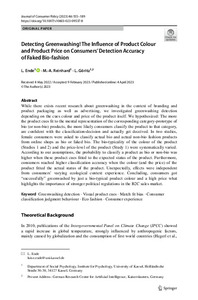| dc.date.accessioned | 2023-07-21T10:22:13Z | |
| dc.date.available | 2023-07-21T10:22:13Z | |
| dc.date.issued | 2023-04-04 | |
| dc.identifier | doi:10.17170/kobra-202307218433 | |
| dc.identifier.uri | http://hdl.handle.net/123456789/14906 | |
| dc.description.sponsorship | Gefördert im Rahmen des Projekts DEAL | |
| dc.language.iso | eng | |
| dc.rights | Namensnennung 4.0 International | * |
| dc.rights.uri | http://creativecommons.org/licenses/by/4.0/ | * |
| dc.subject | Greenwashing detection | eng |
| dc.subject | Visual product cues | eng |
| dc.subject | Match fit bias | eng |
| dc.subject | Consumer classification judgment behaviour | eng |
| dc.subject | Eco fashion | eng |
| dc.subject | Consumer experience | eng |
| dc.subject.ddc | 150 | |
| dc.title | Detecting Greenwashing! The Influence of Product Colour and Product Price on Consumers’ Detection Accuracy of Faked Bio‑fashion | eng |
| dc.type | Aufsatz | |
| dcterms.abstract | While there exists recent research about greenwashing in the context of branding and product packaging as well as advertising, we investigated greenwashing detection depending on the cues colour and price of the product itself. We hypothesized: The more
the product cues fit to the mental representation of the corresponding category-prototype of bio (or non-bio) products, the more likely consumers classify the product to that category, are confident with the classification-decision and actually get deceived. In two studies, female consumers were asked to classify actual bio and actual non-bio fashion products from online shops as bio or faked bio. The bio-typicality of the colour of the product (Studies 1 and 2) and the price-level of the product (Study 1) were systematically varied. According to our assumptions, the probability to classify a product as bio or non-bio was higher when these product cues fitted to the expected status of the product. Furthermore, consumers reached higher classification accuracy when the colour (and the price) of the product fitted the actual status of the product. Unexpectedly, effects were independent from consumers’ varying ecological context experience. Concluding, consumers got “successfully” greenwashed by just a bio-typical product colour and a high price what highlights the importance of stronger political regulations in the B2C sales market. | eng |
| dcterms.accessRights | open access | |
| dcterms.creator | Ende, Luise | |
| dcterms.creator | Reinhard, Marc-André | |
| dcterms.creator | Göritz, Lorena | |
| dcterms.extent | 155-189 | |
| dc.relation.doi | doi:10.1007/s10603-023-09537-8 | |
| dc.subject.swd | Greenwashing | eng |
| dc.subject.swd | Bekleidungsindustrie | ger |
| dc.subject.swd | Verbraucherverhalten | ger |
| dc.subject.swd | IPCC | ger |
| dc.subject.swd | Betrug | ger |
| dc.subject.swd | Business-to-Consumer | eng |
| dc.type.version | publishedVersion | |
| dcterms.source.identifier | eissn:1573-0700 | |
| dcterms.source.issue | Issue 2 | |
| dcterms.source.journal | Journal of Consumer Policy | eng |
| dcterms.source.volume | Volume 46 | |
| kup.iskup | false | |


